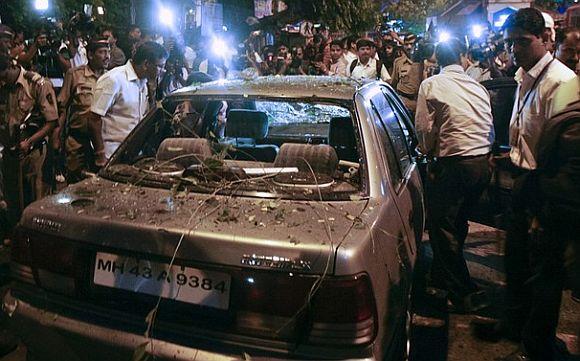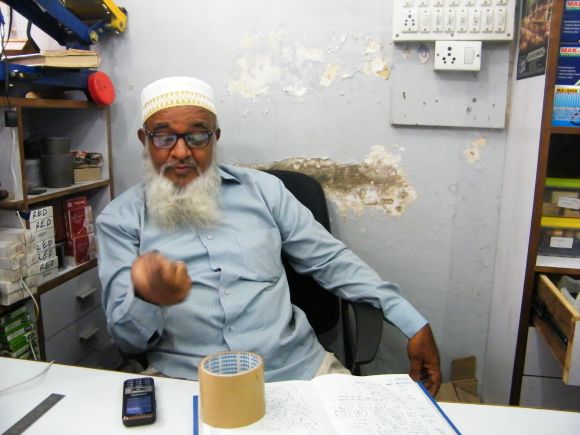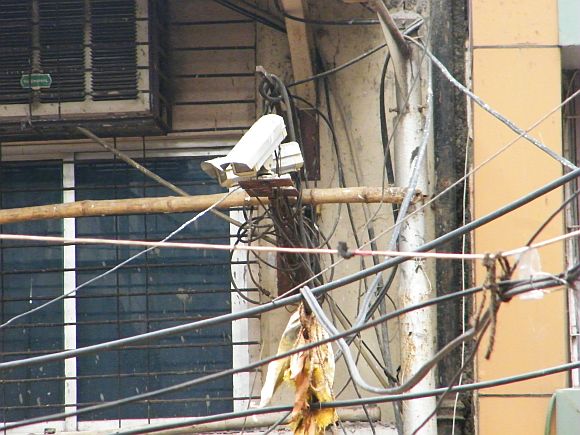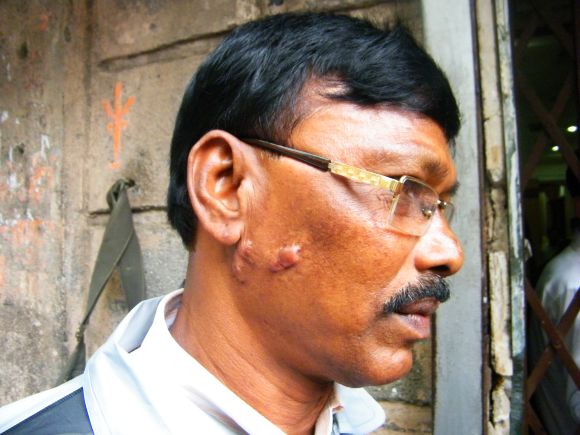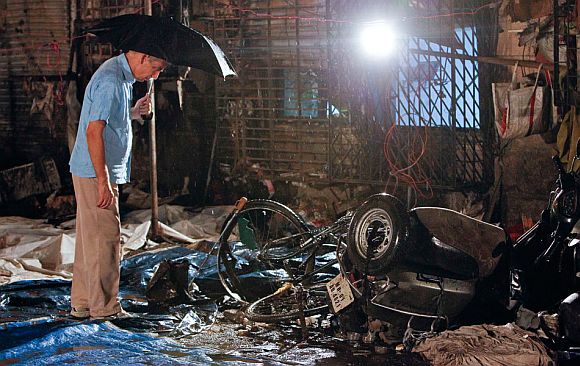 | « Back to article | Print this article |
Our lives are wrapped in time bombs: 13/7 survivor
It's been a year since three blasts ripped through crowded localities of Mumbai, killing 26 people and injuring 130.
Rediff.com correspondents walked down memory lane with survivors and re-lived the fateful July 13 evening that was smeared with blood, agony and fear.
Here's Principal Correspondent Divya Nair's story.
On July 13, 2011, when the average Mumbaikar was either returning from work in a crowded local train or a bus, three blasts rocked the city of Mumbai within a span of 10 minutes.
The first device was reported to be planted in a Honda Activa scooter at Khau Gali in south Mumbai's Zaveri Bazaar area. The bomb exploded at 18:54 pm. The second device was planted in a tiffin box exploded at 18.55 pm at the Opera House near Charni Road, and the third, placed on an electric pole at a Kabutar Khana bus stand in Dadar area detonated at 19:06 pm.
In 10 minutes, 26 people lost their lives and 130 were injured. As phone lines were jammed, people at home switched on their television sets waiting for updates the whole evening. The news of innocent victims and families who lost their kin was widely discussed for not more than a week across all national and local newspapers, television channels and social networking sites.
A year later, an average Mumbaikar who wasn't part of the accident remembers it as yet another blast that made them realise how unsafe and unpredictable their lives were.
The luckier ones pray to God for being kind on them, but it is the ones who were part of the gory incident who continue to preserve it as a bloody nightmare thriving, cursing and accusing their fate for being at the wrong place at the wrong time.
Click on NEXT to read further...
'The blast took place right before my shop'
The cynicism was stark in the voice of Taiyyab Nishanwalla owner of Super Tools in Khau Galli area, before whose shop the first explosion took place that evening.
"Do you even know what the place looked like a year before?" he began, glancing straight into my eyes as he involved me into the details.
"The blast took place right before my shop. There was a boom and the next second, we see the head of a Bengali guy inside the shop. His leg was found later in the shop opposite mine. The police had so much difficulty putting parts of his body together. They were split to pieces," he said.
Two landlines in his shop were ringing continuously as the 61-year-old owner spoke with rediff.com but he paid no attention. "I cannot hear clearly from my left ear. I have to answer from my right ear," he responded calmly later.
Two of his employees, Shivaji Patil (25) and Uttam Pandurang Jadhav (28) were also injured in the blast. While Shivaji is yet to restore his hearing from the left ear, Uttam sometimes feels the pain of a glass piece piercing his throat.
While all three were offered a compensation of Rs 2 lakh, Nishanwalla complains that he had to spend Rs 10 lakh to revive his shop and load it with supplies.
Click on NEXT to read further...
'They put this camera for our safety and closed their eyes'
People living in the area who remember the blast that took place in 2003 in Zaveri Bazaar say not much has changed since then.
Mahadev Prasad Gupta, 61, who runs a makeshift shop in the Khau Galli area few metres away from where the blast took place that night, points us to the CCTV cameras on the edge of the lane and sneers.
"They put this camera for our safety and closed their eyes. When the blast took place, the plastic sheet over my head collapsed and the flames were so close. A man selling papads got burnt in the flames and died immediately."
Gupta says there was lot of blood, and the police came only 20 minutes later. It was the locals who rushed the injured to GT and JJ Hospitals respectively.
"When the police came, they cordoned off this lane and barred us entry. We had to forcefully shut shop for a month. But I have a licence to run a shop, why should I be scared of the police? I stood my ground and said I will go to court if you don't let me work here. This place is known as Khau Galli, but as you can see, there are only few shops left now. The police don't allow you to run your business if you don't have a licence," says Gupta.
A few minutes away from Khau Galli is Opera House where the second blast took place. A place constellated by brokers dressed in smart formals discussing deals, it is an extremely crowded place at any time of the day.
Needless to say, this place reported the maximum number of casualties last year.
Click on NEXT to read further...
'How long can you sit at home and complain?'
Even after a year, it was not an easy task getting people to talk about the incident. While some of the paan-shop owners denied being there, others who were present refused to give any details.
After much coaxing, a local guy who had lived there for the last two decades told me that people were scared about giving any details to strangers since the incident took place.
Paresh Shah, a broker was the first one who spoke of the bomb blast. Pointing to the spot of the accident, he said, the place reeked of blood and mangled bodies a year before.
"This is a busy place, always crowded with people. There is a security guard, but nobody cared so much. There used to be a man selling sandwich near the tree there, where the blast took place. Within seconds, all was finished."
Shah then introduced me to Sahadev Bhuvad, another broker who lost his right leg in the blast.
"I was standing right here when I heard a loud sound. Before I could react, I was lying on the ground soaked in blood. Somehow, I felt my legs and realised that it was gone. I fumbled to search for my mobile phone, but could not find it. When my daughter who heard about the blast on TV called to check on me, all I could tell her was that my leg was gone, and I was alive."
Bhuvad is 57 and lives with his family in Bhayander. He walks with a limp and stands up with some effort balancing on his new wooden leg. He received compensation of Rs 2 lakh, but he says the treatment cost him upto Rs 4 lakh and put him out of work for nearly six months.
But the incident has not deterred his spirit at all. "How long can you sit at home and complain? We have to move on for the sake of our families. If I sit at home, who will take care of them?" he quips.
Click on NEXT to read further...
'No one is safe in the city. Anything can happen to you anytime'
Security guard Hari Yadav who is employed in the same building where the blast took place had come to shut shop when an explosion ripped past the glass door and threw him on the floor.
"I was unconscious and some people lifted and took me to the nearby hospital. I suffered so many injuries and there are stitches all over my back. I am still taking medicines for no fault of mine," complains Yadav who lives a hand to mouth existence and now spends at least Rs 1,000 every month on medicines.
He says, there are many CCTVs in the place and most of the hawkers were cleared from the area, but he still can't get over the nightmare of the few seconds that makes him tremble in his sleep.
"I have been working here for 17 years and always felt safe. But this incident has made me realise that no one is safe in the city. Anything can happen to you anytime," said 37-year-old Yadav, a resident of Khar in Mumbai.
While Yadav received monetary compensation upto Rs 2 lakh for his surgery, there are those like Vinod Badade who were denied compensation because they did not register their names at the time of accident.
"The police informed us that our treatments will be conducted free of cost. But when we went to Harkisandas Hospital, they told us that our names were not registered at the spot of the accident.
"So, we have to pay for our treatment. When an accident takes place, do we rush for treatment or wait to get registered," asks Badade who suffered injuries on his ear and body.
Sadashiv Shripati Kamble, who runs a chappal shop next to Kabutar Khana in Dadar, is equally miffed at the authorities. Kamble's shop is right next to the bus stop where the bomb exploded at 7.06 pm.
"I was asked to wait and testify to the police because my shop was the closest to the bus stop. My shop was blown up in the fire and covered in soot. But it was raining and I did not know how much of the injuries I suffered were serious. I was summoned to the station many times.
"It was only a few days later, that my body swelled up and the doctor told me that it was the after effects of the blasts. I have all the relevant documents but I am yet to receive any compensation," says Kamble who has already spent over a lakh rupees in medicines and in reviving his shop. He also complains of the difficulty one faces waiting patiently to collect documents from concerned officials.
Kamble shows us some of his papers from a yellow coloured file and says, "Do you know how difficult it is to get paperwork done? Now, when I have all the papers, they say my case is pending for inquiry. I don't know when or if, I will get any compensation."
Click on NEXT to read further...
'Anyone who lives in Mumbai knows that their lives are wrapped in time bombs'
Despite the hopelessness of his efforts and the callous attitude of officials in his case, Kamble continued to attend the 'Be the eyes and ears of the police' initiative by the Mumbai police held on February 6, 2012 because he wanted to make himself heard.
"I told the senior official there that even after helping the police at the sake of my treatment and health, I was yet to get any compensation. Next time, if somebody wants to help, they will think twice. Even if here is an accident, people will not hesitate to help each other but they will certainly hesitate to help the police," he says sharing a lesson from his personal experience.
Preeti Lalit Vaishnvikar, who works in a jewellery shop opposite the bus stop next to Kabutar Khana, says it is the chalta hai attitude that has kept the city alive and tolerant amidst terror.
She remembers L K Advani and Uma Bharti (BJP leaders) visiting the place last year and how trivial it all seems now.
"They said namaste standing outside our shop and we did the same. They asked a few questions to people nearby and left. What more can they do?"
She says people living in Mumbai are too busy to care for other's lives, until an accident brings them together.
"Anyone who lives in Mumbai knows that their lives are wrapped in time bombs that are waiting to blast any time. No place is safe -- trains, busses, bus stops... We are lucky today, but we may not be spared tomorrow. My friend's husband was sent to coma in the train blasts in 2006. She was two months pregnant when the blast took place and six years later, her husband is still recovering. But he can barely remember his family members."
For, the city has been bombed, wounded and injured by terrorism of some form at least once every year, people react with the same angst and cynicism because they don't know whom to blame. In less than a week, people are rebuilding their lives to be back to business and make up for the losses of forcefully staying out of work.
A few years later, they may not even remember the date or the names of people, but the lack of affirmative action by people in governance will continue to infest their lives forever.
Click on NEXT to go further...
TOP photo features of the week
Click on MORE to see another set of PHOTO features...
